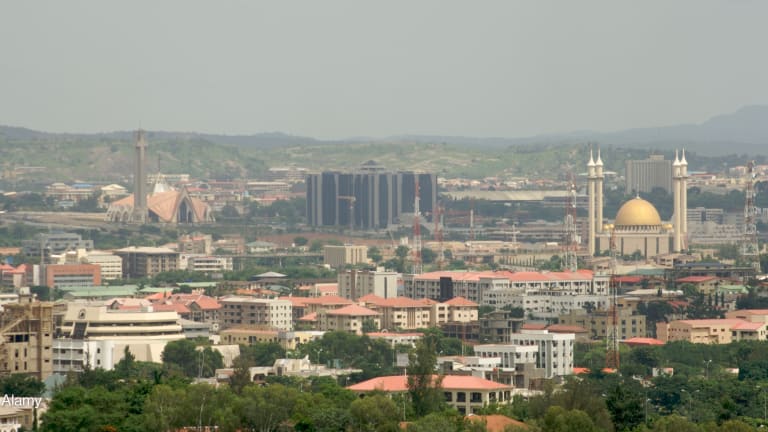
Humanitarian organizations in Iraq are hard at work writing funding proposals as the latest upsurge in violence — and therefore displacement — in the country's north has finally started to attract donors' attention.
The U.K. Department for International Development activated its rapid response facility this week, and made 3 million pounds ($5.1 million) available for aid groups planning to respond to the latest crisis. And it's not just DfID taking notice. The U.S. Agency for International Development, European Commission Humanitarian Aid department and Canadian government have all sent representatives to the region, David Evans, Mercy Corps' deputy regional director in the Middle East, told Devex.
Norway has just announced 60 million Norwegian Kroner ($9.89 million) in humanitarian aid to be made available for this crisis.
This uptick in donor interest in the country has been well-received by organizations struggling to make ends meet with the resources they have. Many of them have been responding to twin crises — internal displacement that's been going on for years and the inflow of refugees from Syria.
The money, however, is not flowing as fast as nongovernmental organizations hope it would, Evans argued.
Hashim Al Assaf, executive director of the NGO Coordination Committee for Iraq, told Devex that the general impression among implementers is that donors are wary of disbursing funding in Iraq "for political reasons." This circumstance appears to have been compounded by other crises, like Syria and South Sudan.
This is not to say though that there hasn’t been money coming in for development work in Iraq. A considerable chunk of funds continue to flow to development contractors doing construction or capacity building work, observed Adrian Ouvry, head of Christian Aid's humanitarian programs in Asia, the Middle East, Latin America and the Caribbean.
"American contractor organizations are still receiving large grants or contracts from various arms of the U.S. government ... [but] that funding doesn't seem to be reaching — at least nowhere near the same scale as it used to or as it should — the more traditional NGO type of implementers," he said.
NGOs struggling
It's not only limited resources that's hampering NGOs' response in Iraq.
The scale of the latest displacement is so high — nearly 1 million — that many NGOs are having a hard time gathering accurate information on humanitarian needs to inform their response.
"Many activities are halted right now [because of difficulty in movement and communications]," Evans told Devex. Mercy Corps, for instance, is struggling to continue its program on building local capacity.
Mercy Corps is looking at a “two-phase response.” First, it aims to provide basic needs and, if needed, distribute unconditional cash or vouchers. Second, it will focus on income-generating projects, as the situation descends into a protracted crisis.
But for now, like most organizations, it is completing its own needs assessment, figuring out where it can best make use of currently limited resources and meet the most urgent needs.
"We're still at that stage, but I would hope that by now that some agencies, especially U.N. agencies that have some preposition stocks, have already been able to respond in terms of meeting some of the immediate needs," noted Ouvry from Christian Aid.
The situation however is so complex — and changing by the hour — that aid groups have to continuously assess the situation.
“Areas that we would have worked in are suddenly changing hands and civilians are getting stuck between the warring parties,” Karl Schembri, regional media manager for Save the Children in the Middle East and Eurasia, told Devex.
Families that initially had money to spare for motels or rented flats are now running out of money, leading them to join others seeking shelter in parks, schools, mosques, or out on the streets without access to safe drinking water and sanitation facilities.
But their biggest concern, Schembri said, are those families or individuals that are trapped in the areas where heavy fighting is taking place. These include children and individuals with mobility problems.
“This is not your typical humanitarian emergency — thousands are dispersed around the country, many in places that are very hard to reach, making it a very risky operation,” he said.
Schembri said local authorities are “doing their best,” but support from the international community is crucial. Save the Children, he said, already has a team explaining the situation to donors.
More staff needed
Because of the huge displacement and increasing demand for services, more and more organizations are trying to boost their staff numbers in Iraq. Mercy Corps is recruiting operational and program staff, and Save the Children is beefing up its personnel on the ground.
Oxfam, which doesn’t have a permanent presence in the country, flew in a team of experts to help in the emergency response. Christian Aid, meanwhile, is coordinating its response with local partners.
“Local partners have a much higher level of acceptance,” Ouvry said. “They also have the flexibility and local knowledge. They know what the boundaries are, who they can work with and what they can do safely.”
There are those like U.K.-based charity Muslim Hands though that prefer to rely on its large volunteer base.
"Our office is based in Baghdad, so working in the north is very difficult and no doubt will stretch us," said Mohammad Shafiq, an official from the organization. But we have “enough personnel as well as a large volunteer group. Therefore [we] are looking to work directly without a collaboration in the north of Iraq.”
What do you think these NGOs can do to secure the funding they need from donors to respond adequately to the crisis in Iraq? Please let us know by leaving a comment below or sending an email to news@devex.com.
Read more development aid news online, and subscribe to The Development Newswire to receive top international development headlines from the world’s leading donors, news sources and opinion leaders — emailed to you FREE every business day.








